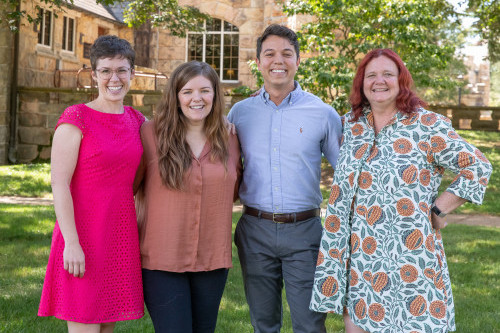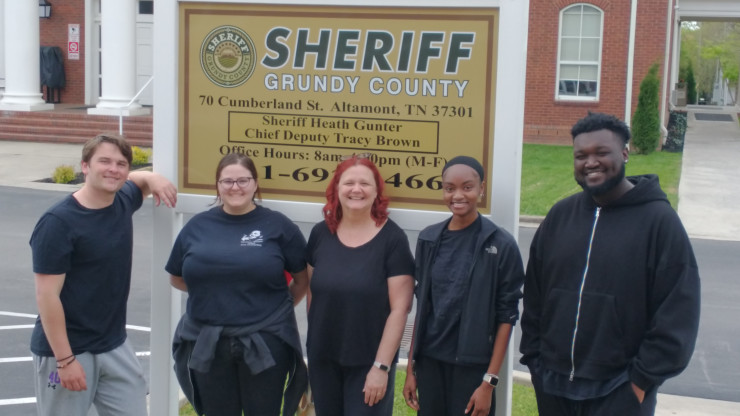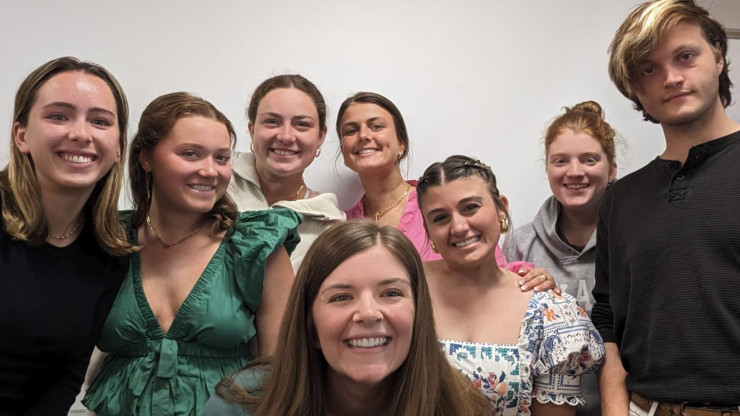Four Faculty Fellows Help Re-Invigorate Community-Engaged Learning at Sewanee
 During 2023- 2024, Kate Cammack (Neuroscience/Psychology), Jennifer Matthews (Theatre), Katy Morgan (Psychology), and Sid Simpson (Politics) served as Community Engaged Learning (CEL) Faculty Fellows. With support from OCE, the Bonner Foundation, the McCrickard Fund, and the Office of the Chaplain, each taught a course with a CEL component, devised a project to support CEL on campus, and engaged in dialogue with the Faculty Fellows for Purpose and Career.
During 2023- 2024, Kate Cammack (Neuroscience/Psychology), Jennifer Matthews (Theatre), Katy Morgan (Psychology), and Sid Simpson (Politics) served as Community Engaged Learning (CEL) Faculty Fellows. With support from OCE, the Bonner Foundation, the McCrickard Fund, and the Office of the Chaplain, each taught a course with a CEL component, devised a project to support CEL on campus, and engaged in dialogue with the Faculty Fellows for Purpose and Career.
The faculty incorporated CEL into course learning in various ways. In POLS 238 Punishment, Simpson’s students worked with Blue Monarch, a rehabilitation and recovery program, to learn from program organizers and participants and to assist with the organization’s annual fundraiser. Students also participated in a five-week pen pal program with incarcerated people at Grundy County Correctional Facility (GCCF) in Altamont, Tennessee. Writing prompts were sent back and forth between Sewanee and GCCF, which allowed the pen pals to get to know one another more and more with each letter exchange. In THTR 261 Community Engaged Theatre, Matthews’s students collaborated with the Arts Inside program at GCCF to create theatrical performances based on listening sessions and interviews. Using devised theatre techniques, the Sewanee students integrated ideas from the GCCF participants during class time, and then took those ideas to the “Altamont students” for feedback and inclusion in the final performance. The project culminated in performances at the GCCF in late April. Students in Cammack’s PSYC 350 Drugs and Behavior partnered with Grundy County Safe Communities Coalition (GSCC), an organization focused on drug prevention and education. Students designed research-informed infographics on the science of drugs/alcohol use that could be posted on social media, thereby helping to debunk misconceptions. Students in Morgan’s PSYC 367 Community-Based Evaluation Research partnered with the Friends of South Cumberland State Parks, Mountain T.O.P., and Early Literacy Ambassadors. They worked directly with these organizations’ representatives to design evaluation research, collect and analyze data, and complete evaluation reports.

All faculty were enthusiastic about how CEL fostered student learning. Working with Blue Monarch helped students in POLS 238 to see rehabilitative and restorative justice in action, especially as an alternative to incarceration in cases of non-violent offenses. Simpson stressed that the pen pal program reinforced a course theme: Despite incarcerated people being dehumanized and demonized in popular discourse, people in jail are “entirely normal like us.” Matthews admits that in the beginning, her students were a “little stressed” about the idea of having to create a performance, but what was really important was the journey of companionship and bridge building that all experienced as a community of artists. Morgan said that CEL was “crucial to students’ learning in the course,”' since it allowed students to engage in ethical, participatory evaluation practices that address power dynamics and promote social justice. Cammack’s students learned to use scientific evidence to address common misconceptions about drugs and alcohol, and they practiced how to communicate science-based findings to non-scientific audiences. There also was an unanticipated benefit for Cammack’s students: GSCC director Chasity Melton inspired students to think about pursuing careers in coalition work or addiction support and education services after graduation.

Students themselves recounted many lessons from CEL. One in Simpson’s course stated, “I learned a lot about punishment and criminal justice that will be useful for law school and my career.” Both Morgan’s and Cammack’s students valued learning about the local place, power, and privilege, while Morgan’s students said they came to appreciate the challenges of community-based research. In all courses, students reported re-examining their biases about local people and their situations. As one theatre student said, “We [Sewanee and GCCF students] have more in common with each other than we'd like to admit. Even though there's different social circumstances, socioeconomic and cultural divides, we can bond over stories.” One student summed up the holistic learning that CEL makes possible: “In a weird way this class made me feel like I grew up and accomplished something for the bettering of someone else's life instead of at Sewanee where it's very ‘you-based’. "

